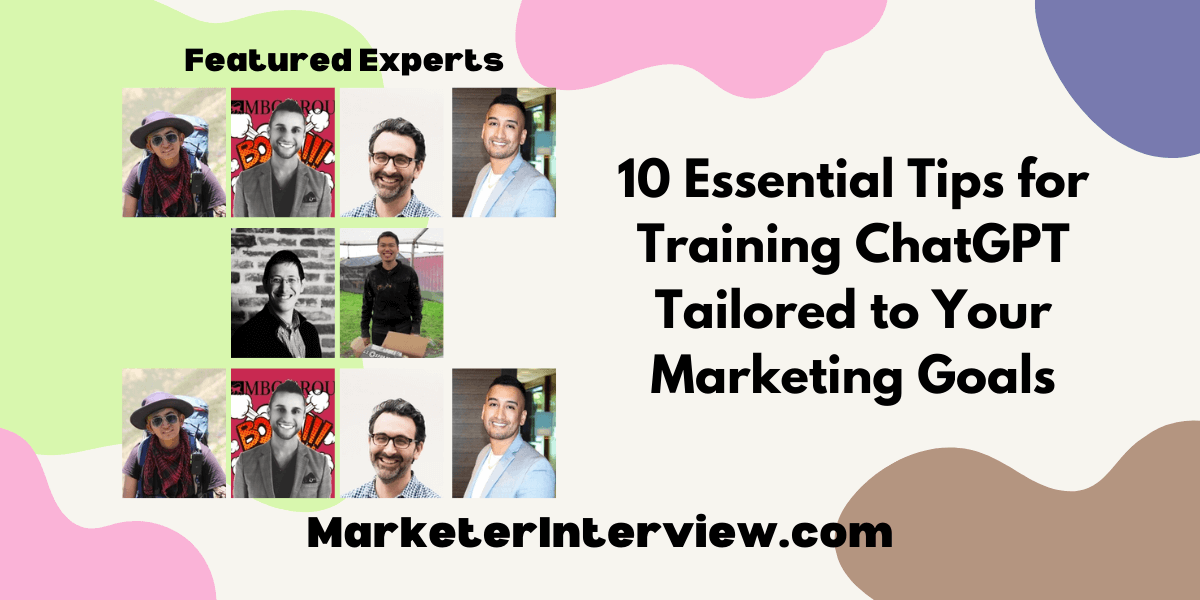10 Essential Tips for Training ChatGPT Tailored to Your Marketing Goals
In the digital age, tailoring AI like training ChatGPT to serve specific marketing strategies is essential. We’ve gathered insights from CEOs and marketing experts, offering their best tips from specializing your ChatGPT training to articulating context-rich prompts. Dive into these ten expert pieces of advice to enhance your ChatGPT’s performance in the marketing realm.
Want to get quoted in MarketerInterview.com content just like this? Apply to become a contributor today!
Contents
- 1 Specialized Training ChatGPT
- 2 Use Industry-Specific Language
- 3 Treat ChatGPT Like an Intern
- 4 Specify Your Audience Clearly
- 5 Build Detailed Customer Personas
- 6 Emulate Your Brand’s Voice
- 7 Start Simple and Adjust
- 8 Employ Proven Marketing Frameworks
- 9 Provide Clear Training Guidelines
- 10 Articulate Context-Rich Prompts
Specialized Training ChatGPT
You can’t ask a GPT to be a master of everything, just like you can’t ask someone to be an expert in everything.
After creating and publishing six ChatGPTs for positioning strategy, market research, and go-to-market challenges, the toughest part is to pick your battles and acknowledge that you will end up with multiple GPTs.
For each type of skill required, you should create and training ChatGPT for that unique skill and create another ChatGPT with other skills.
For example, you won’t have good results if you want your ChatGPT to be a great positioning strategist and a great technical writer or SEO expert at the same time. Those are very different skills that require different training and chats, just like you would do when hiring an individual.

Jose Bermejo, Founder and Managing Partner, Predictable Innovation Strategy
Use Industry-Specific Language
Effective training ChatGPT for specific marketing requirements, it is advisable to concentrate on employing pertinent and industry-specific terminology. This approach ensures the optimization of word choice, sentence structure, readability, and overall eloquence while preserving the original intent. This will help ChatGPT understand the context and language used in your particular market, making its responses more accurate and effective.
It’s important to provide a variety of examples and scenarios related to your marketing goals during the training process. This will allow ChatGPT to learn and adapt to different situations, making it more versatile in providing marketing support. Additionally, regularly reviewing and fine-tuning the training data will help ChatGPT stay up-to-date with any changes or updates in your industry.
By continuously refining its knowledge and understanding of your target market, training ChatGPT can better assist in meeting your specific marketing needs. Lastly, don’t forget to involve your marketing team in the training ChatGPT process. They can provide valuable insights and feedback on ChatGPT’s performance, allowing for a more collaborative approach toward achieving your marketing goals.

Brandon Beatty, Founder and CEO, Southern Hills Home Buyers
Treat ChatGPT Like an Intern
Weirdly, the one that seems to most click with people is to just treat ChatGPT as an intern. They can do some good work with just their native knowledge, but if you really want to get something out of them, then you need to give them the in-house knowledge they are lacking.
By far, the easiest way to get the ball rolling, in my experience, is to just upload your brand guidelines and ask it to abide by them for future prompts via the custom instructions feature. You’ll likely get a few questions to answer to make them really stick, but it is well worth the time and effort.

Onno Halsema, CEO, Contentoo
Specify Your Audience Clearly
When prompting ChatGPT, I make sure to include who the audience is for the copy they’re about to provide me. Sure, training ChatGPT can emulate the tone of a specific brand or writer, but it does not know who it’s writing for, and therefore, needs this detail so that it can relate to my audience.

Kristine Thorndyke, Co-Founder, TEFL Hero
Build Detailed Customer Personas
One of the better ways to training ChatGPT has been to input your buyer segments and build customer personas.
You have fields where you can add a detailed outline of potential opportunities for marketing, where you can drop in demographic and sociographic information, as well as things like trends and customer needs for that specific segment. It lets you really fine-tune how the tool approaches creating customized content that’s a significant step up from the generic materials you’d normally get out of it.

Dragos Badea, CEO, Yarooms
Emulate Your Brand’s Voice
Here’s one tip for training ChatGPT for marketing: Talk like your people. Imagine the modern and most involved online fan of your brand chatting online. Write what they would say, using their slang, jokes, and inside references. Feed these conversations to ChatGPT, show examples of your brand voice, and let it soak up your tribe’s rhythm.
When it talks about marketing, it will sound exactly like one of them, which is pure gold. Remember, humans are the only ones who can truly capture the soul, whereas robots can only copy words.

Fahad Khan, Digital Marketing Manager, Ubuy India
Start Simple and Adjust
Keep it simple. Don’t throw fancy stuff at ChatGPT. Break down your questions into small bits. Imagine explaining it to a friend who’s not into techy stuff.
Start slow. Give ChatGPT straightforward prompts. See how it responds. If it’s a bit off, tweak your approach. It’s like teaching a friend to play a game—you start with the basics and adjust as you go.
I usually imagine ChatGPT as my brainstorming pal. I toss questions about marketing ideas or content themes, and it gives me cool perspectives. It’s like having a digital sidekick for bouncing ideas around.
So, think of ChatGPT as your creative companion. Keep it simple, be clear in what you ask, and watch how it becomes your go-to for generating unique and fresh ideas for your marketing game.

Daniel Bunn, Director, Incensen
Employ Proven Marketing Frameworks
Create a chat agent with the specific frameworks you aim to utilize in your marketing. We created a copywriting chat agent based on existing and proven copywriting frameworks, such as AIDA. I also advised it to reference the insights of well-known copywriters.
So, tell your chat agent exactly what you want it to output, and then inform it of the absolute best data sets to review in that field. Then, tinker with it until it works as well as you’d like.

Robert Brill, CEO, Brill Media
Provide Clear Training Guidelines
To train ChatGPT effectively for specific marketing needs, it’s essential to offer clear and detailed guidelines during the fine-tuning process. These guidelines should specify the desired tone, style, and format for responses, aligning the AI with your brand’s voice and marketing objectives. Tailor the training to your unique marketing use cases, whether it’s content creation, customer support, or social media management, to ensure that the AI understands and performs tasks relevant to your goals.
Establish a feedback loop for ongoing refinement, regularly reviewing and evaluating the AI’s responses in real-world marketing scenarios. Provide feedback on both correct and incorrect responses, allowing you to guide the model toward improved performance. Ensure that the training data used is of high quality and incorporates real examples from your marketing materials, customer interactions, and industry-specific content.
Additionally, maintain ethical considerations to ensure that the AI-generated content aligns with your brand’s values and complies with ethical and legal guidelines. With these practices in place, ChatGPT can become a valuable tool for enhancing marketing efforts, maintaining brand consistency, and delivering content that resonates with your target audience.

Madison T, Ecommerce Manager, My Supplement Store
Articulate Context-Rich Prompts
If you’re training ChatGPT to meet specific marketing needs, my tip is to provide clear and context-rich prompts. Clearly articulate the context, goals, and any specific criteria you have in mind for the marketing content.
For instance, if you want marketing copy for a product, specify key features, target audience, and desired tone. The more detailed and precise your prompts, the better ChatGPT can understand and generate content tailored to your marketing requirements.
Additionally, fine-tune and iterate based on the model’s responses, providing feedback to help it better grasp your unique marketing language and style over time.

Khurram Mir, Founder and Chief Marketing Officer, Kualitee
Want to get quoted in MarketerInterview.com content just like this? Apply to become a contributor today!






